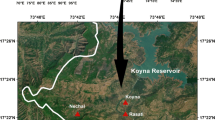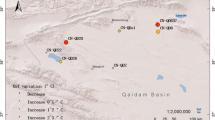Abstract
The impact of recent climate change varies around the world, and understanding the regional variations is important for making accurate deductions and generating future climate predictions and mitigation plans. Borehole temperature reconstruction is one of the common methods to determine the ground surface temperature (GST) history of a region. In this study, high-precision (< 0.01 K) borehole temperature-depth data from five different locations in Western Black Sea Region of Turkey were used for reconstruction of the GST changes for the last century. Four of the measurement sites are located in rural areas in the inland section and free from the urban heat island interference. The reconstructions reveal that GSTs have dropped by an average of 0.1 °C between 1900 and 1970 and have risen by an average of 0.99 °C between 1970 and 2010 in the study area. Results from inland sites show average cooling of 0.24 °C between 1900 and 1975 and average warming of 0.94 °C until 2010. The results in the coastal area show no cooling period. The rapid warming trend in 1990–2010 revealed by GST reconstructions indicates high sensitivity of the region to present-day global warming.







Similar content being viewed by others
Data availability
Data sets generated during the current study are available from the corresponding author on request.
References
Akkiraju, V. V., & Roy, S. (2011). Geothermal climate change observatory in south India 1: Borehole temperatures and inferred surface temperature histories. Physics and Chemistry of the Earth, Parts a/b/c, 36(16), 1419–1427. https://doi.org/10.1016/j.pce.2011.01.004
Alexander, L. V., Zhang, X., Peterson, T. C., Caesar, J., Gleason, B., Klein Tank, A. M. G., Haylock, M., Collins, D., Trewin, B., Rahimzadeh, F., Tagipour, A., Rupa Kumar, K., Revadekar, J., Griffiths, G., Vincent, L., Stephenson, D. B., Burn, J., Aguilar, E., Brunet, M., et al. (2006). Global observed changes in daily climate extremes of temperature and precipitation. Journal of Geophysical Research. https://doi.org/10.1029/2005JD006290
Balkan, E., Erkan, K., & Şalk, M. (2017). Thermal conductivity of major rock types in western and central Anatolia regions, Turkey. Journal of Geophysics and Engineering, 14(4), 909–919. https://doi.org/10.1088/1742-2140/aa5831
Baltaci, H., & Arslan, H. (2022). Seasonal and regional variability of wet and dry spell characteristics over Turkey. Atmospheric Research, 270, 106083. https://doi.org/10.1016/j.atmosres.2022.106083
Birch, A. F. (1948). The effects of Pleistocene climatic variations upon geothermal gradients. American Journal of Science, 246(12), 729–760. https://doi.org/10.2475/ajs.246.12.729
Brunet, M., Jones, P. D., Sigró, J., Saladié, O., Aguilar, E., Moberg, A., Della-Marta, P. M., Lister, D., Walther, A., & López, D. (2007). Temporal and spatial temperature variability and change over Spain during 1850–2005. Journal of Geophysical Research. https://doi.org/10.1029/2006JD008249
Bryson, J. M., Bishop-Williams, K. E., Berrang-Ford, L., Nunez, E. C., Lwasa, S., Namanya, D. B., & Harper, S. L. (2020). Neglected tropical diseases in the context of climate change in East Africa: A systematic scoping review. The American Journal of Tropical Medicine and Hygiene, 102(6), 1443–1454. https://doi.org/10.4269/ajtmh.19-0380
Chapra, S. C., & Canale, R. P. (2011). Numerical methods for engineers. Mcgraw-Hill.
Chouinard, C., Fortier, R., & Mareschal, J.-C. (2007). Recent climate variations in the subarctic inferred from three borehole temperature profiles in northern Quebec, Canada. Earth and Planetary Science Letters, 263(3–4), 355–369. https://doi.org/10.1016/j.epsl.2007.09.017
Clow, G. D., Saltus, R. W., & Waddington, E. D. (1996). A new high-precision borehole-temperature logging system used at GISP2, Greenland, and Taylor Dome, Antarctica. Journal of Glaciology, 42(142), 576–584. https://doi.org/10.3189/s0022143000003555
Correia, A., & Šafanda, J. (2001). Ground surface temperature history at a single site in southern Portugal reconstructed from borehole temperatures. Global and Planetary Change, 29(3–4), 155–165. https://doi.org/10.1016/S0921-8181(01)00087-X
Costain, J. K. (1970). Probe response and continuous temperature measurements. Journal of Geophysical Research, 75(20), 3969–3975. https://doi.org/10.1029/JB075i020p03967
Diffenbaugh, N. S., Swain, D. L., & Touma, D. (2015). Anthropogenic warming has increased drought risk in California. Proceedings of the National Academy of Science, 112(13), 3931–3936. https://doi.org/10.1073/pnas.1422385112
Eppelbaum, L., Kutasov, I., & Pilchin, A. (2014). Thermal properties of rocks and density of fluids. Lecture Notes in Earth System Sciences. https://doi.org/10.1007/978-3-642-34023-9_2
Eppelbaum, L. V., Kutasov, I. M., & Barak, G. (2006). Ground surface temperature histories inferred from 15 boreholes temperature profiles: Comparison of two approaches. Earth Sciences Research Journal, 10(1), 25–34.
Erkan, K. (2015). Geothermal investigations in western Anatolia using equilibrium temperatures from shallow boreholes. Solid Earth, 6(1), 103–113. https://doi.org/10.5194/se-6-103-2015
Erkan, K., Akkoyunlu, B., Balkan, E., & Tayanç, M. (2017). A portable borehole temperature logging system using the four-wire resistance method. Journal of Geophysics and Engineering, 14(6), 1413–1419. https://doi.org/10.1088/1742-2140/aa7ffe
Erkan, K., Akkoyunlu, B., İnal, M. O., Balkan-Pazvantoğlu, E., & Tayanç, M. (2019). Twentieth-century paleoclimatic modeling of borehole temperatures in western and central Anatolia regions, Turkey. International Journal of Earth Sciences, 108(4), 1137–1146. https://doi.org/10.1007/s00531-019-01698-7
Gao, X., & Giorgi, F. (2008). Increased aridity in the Mediterranean region under greenhouse gas forcing estimated from high resolution simulations with a regional climate model. Global and Planetary Change, 62(3–4), 195–209. https://doi.org/10.1016/j.gloplacha.2008.02.002
Göktürk, O. M., Fleitmann, D., Badertscher, S., Cheng, H., Edwards, R. L., Leuenberger, M., Fankhauser, A., Tüysüz, O., & Kramers, J. (2011). Climate on the southern Black Sea coast during the Holocene: Implications from the Sofular Cave record. Quaternary Science Reviews, 30(19–20), 2433–2445. https://doi.org/10.1016/j.quascirev.2011.05.007
Gosnold, W. D., Todhunter, P. E., & Schmidt, W. (1997). The borehole temperature record of climate warming in the mid-continent of North America. Global and Planetary Change, 15(1–2), 33–45. https://doi.org/10.1016/s0921-8181(97)00002-7
Gul, I. H., & Maqsood, A. (2006). Thermophysical properties of diorites along with the prediction of thermal conductivity from porosity and density data. International Journal of Thermophysics, 27(2), 614–626. https://doi.org/10.1007/s10765-005-0007-0
Hansen, J., Sato, M., Ruedy, R., Lo, K., Lea, D. W., & Medina-Elizade, M. (2006). Global temperature change. Proceedings of the National Academy of Sciences, 103(39), 14288–21429. https://doi.org/10.1073/pnas.0606291103
Harris, R. N., & Chapman, D. S. (1997). Borehole temperatures and a baseline for 20th-century global warming estimates. Science, 275(5306), 1618–1621. https://doi.org/10.1029/97JB03297
Harris, R. N., & Chapman, D. S. (1998). Geothermics and climate change: 2. Joint analysis of borehole temperature and meteorological data. Journal of Geophysical Research: Solid Earth, 103(B4), 7371–7383. https://doi.org/10.1029/97jb03296
Ji, F., Wu, Z., Huang, J., & Chassignet, E. P. (2014). Evolution of land surface air temperature trend. Nature Climate Change, 4(6), 462–466. https://doi.org/10.1038/nclimate2223
Jolly, W. M., Cochrane, M. A., Freeborn, P. H., Holden, Z. A., Brown, T. J., Williamson, G. J., & Bowman, D. M. J. S. (2015). Climate-induced variations in global wildfire danger from 1979 to 2013. Nature Communications. https://doi.org/10.1038/ncomms8537
Önol, B., & Semazzi, F. H. M. (2009). Regionalization of climate change simulations over the Eastern Mediterranean. Journal of Climate, 22(8), 1944–1961. https://doi.org/10.1175/2008JCLI1807.1
Pickler, C., Gurza Fausto, E., Beltrami, H., Mareschal, J.-C., Suárez, F., Chacon-Oecklers, A., Blin, N., Cortés Calderón, M. T., Montenegro, A., Harris, R., & Tassara, A. (2018). Recent climate variations in Chile: Constraints from borehole temperature profiles. Climate of the past., 14(4), 559–575. https://doi.org/10.5194/cp-14-559-2018
Pollack, H. N. (1993). Climate change inferred from borehole temperatures. Global and Planetary Change, 7(1–3), 173–179. https://doi.org/10.1016/0921-8181(93)90048-S
Ren, Y.-Y., Ren, G.-Y., Sun, X.-B., Shrestha, A. B., You, Q.-L., Zhan, Y.-J., Rajbhandari, R., Zhang, P.-F., & Wen, K.-M. (2017). Observed changes in surface air temperature and precipitation in the Hindu Kush Himalayan region over the last 100-plus years. Advances in Climate Change Research, 8(3), 148–156. https://doi.org/10.1016/j.accre.2017.08.001
Román-Palacios, C., & Wiens, J. J. (2020). Recent responses to climate change reveal the drivers of species extinction and survival. Proceedings of the National Academy of Sciences, 117(8), 4211–4217. https://doi.org/10.1073/pnas.1913007117
Šafanda, J., Čermak, V., & Bodri, L. (1997). Climate history inferred from borehole temperatures, data from the Czech Republic. Surveys in Geophysics, 18(2/3), 197–212. https://doi.org/10.1023/a:1006535926039
Shen, P. Y., & Beck, A. E. (1991). Least squares inversion of borehole temperature measurements in functional space. Journal of Geophysical Research: Solid Earth, 96(B12), 19965–19979. https://doi.org/10.1029/91JB01883
Shen, P. Y., Pollack, H. N., Huang, S., & Wang, K. (1995). Effects of subsurface heterogeneity on the inference of climate change from borehole temperature data: Model studies and field examples from Canada. Journal of Geophysical Research: Solid Earth, 100(B4), 6383–6396. https://doi.org/10.1029/94jb03136
Tayanç, M., & Toros, H. (1997). Urbanization effects on regional climate change in the case of four large cities of Turkey. Climatic Change, 35(4), 501–524. https://doi.org/10.1023/A:1005357915441
Türkeş, M., Sümer, U. M., & Demir, İ. (2002). Re-evaluation of trends and changes in mean, maximum and minimum temperatures of Turkey for the period 1929–1999. International Journal of Climatology, 22(8), 947–977. https://doi.org/10.1002/joc.777
Türkeş, M., Yozgatlıgil, C., Batmaz, İ, İyigün, C., Kartal Koç, E., Fahmi, F., & Aslan, S. (2016). Has the climate been changing in Turkey? Regional climate change signals based on a comparative statistical analysis of two consecutive time periods, 1950–1980 and 1981–2010. Climate Research, 70(1), 77–93. https://doi.org/10.3354/cr01410
Wang, W., Lee, X., Xiao, W., Liu, S., Schultz, N., Wang, Y., Zhang, M., & Zhao, L. (2018). Global lake evaporation accelerated by changes in surface energy allocation in a warmer climate. Nature Geoscience, 11(6), 410–414. https://doi.org/10.1038/s41561-018-0114-8
Funding
This study was supported by Marmara University, Scientific Research Commission (FDK-2020-10051) and Türkiye Ulusal Jeodezi ve Jeofizik Birliği (TUJJB) (National Union of Geodesy and Geophysics of Turkey) with project TUJJB-TUMEHAP-2020-03.
Author information
Authors and Affiliations
Contributions
All authors contributed to the study conception and design. Material preparation, data collection and analysis were performed by Buğra Çelik and Kamil Erkan. The first draft of the manuscript was written by Buğra Çelik and all authors commented on previous versions of the manuscript. All authors read and approved the final manuscript.
Corresponding author
Ethics declarations
Conflict of interest
The authors have no competing interests to declare that are relevant to the content of this article.
Additional information
Publisher's Note
Springer Nature remains neutral with regard to jurisdictional claims in published maps and institutional affiliations.
Rights and permissions
Springer Nature or its licensor (e.g. a society or other partner) holds exclusive rights to this article under a publishing agreement with the author(s) or other rightsholder(s); author self-archiving of the accepted manuscript version of this article is solely governed by the terms of such publishing agreement and applicable law.
About this article
Cite this article
Çelik, B., Erkan, K., Tayanç, M. et al. Recent Climate Change in Western Black Sea Region of Turkey by Paleoclimatic Reconstruction of Borehole Temperatures. Pure Appl. Geophys. 180, 3607–3620 (2023). https://doi.org/10.1007/s00024-023-03345-4
Received:
Revised:
Accepted:
Published:
Issue Date:
DOI: https://doi.org/10.1007/s00024-023-03345-4




